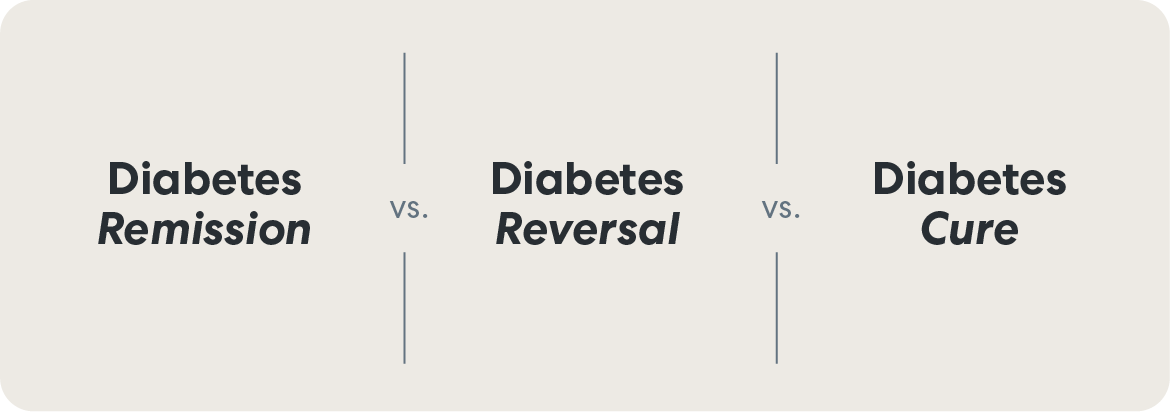Can Type 2 Diabetes be Reversed Permanently? Here’s What the Research Says
By Hope Chang, PharmD and Carolyn Bradner Jasik, MD


The term “diabetes reversal” has hit the mainstream media, which may leave some wondering if we’ve found a cure for diabetes. But when we say diabetes “reversal,” patients hear “cure.” And that’s dangerous.
These days, patients are benefitting from tremendous advances in medications and monitoring so there is good reason for hope. For cardiometabolic conditions where the diseases are highly correlated with lifestyle, it makes sense that patients would believe that if they embrace healthier behaviors and new treatments that their condition could be reversed or cured.
This is especially true for people with type 2 diabetes—a metabolic condition that affects the way your body uses glucose for energy. People with type 2 diabetes either do not produce enough insulin, or their bodies have become resistant to the insulin they do produce—leading to high blood sugar levels. But now, what should we call it, if someone brings their blood sugars down to what we consider “normal levels,” without the help of medications—does this mean they’re cured?
According to a consensus report by the ADA in 2021, the expert panel agreed that the most appropriate term is diabetes remission; this term was also previously suggested by the ADA back in 2009. They go on to say that other terms like resolved, reversal, or cure suggest that the original diagnosis was in error or that an entirely normal state has been established. When, in fact, if the lifestyle changes implemented lapse and return to unhealthy patterns, the diabetes would more than likely return. A term like remission adequately characterizes the clinical follow-up and management that is required to prevent a recurrence.
What is Diabetes Remission?
The ADA's consensus report defines diabetes remission to be: “HbA1c <6.5% (<48 mmol/mol) that occurs spontaneously or following an intervention and that persists for at least 3 months in the absence of usual glucose-lowering pharmacotherapy.”

Meaning that one’s A1C levels return to lower than diabetes-defining levels without using diabetes management medications—with these levels lasting for a minimum of three months. As the definition mentions, this can sometimes happen spontaneously, but more commonly requires an intervention such as lifestyle changes (i.e. exercise, low calorie or low carbohydrate diets) or medical treatment (i.e. bariatric surgery).

Diabetes Remission vs Reversal vs Cure: Why Using the Word Reversal can be Misleading
There are many articles out there, which use the words remission and reversal interchangeably. Why is the term diabetes reversal harmful? The crux of the problem is that reversal implies a permanent change, which patients can misconstrue as cured. This is why the experts agreed that remission would be the proper word.
According to the consensus, remission “strikes an appropriate balance, noting that diabetes may not always be active and progressive yet implying that a notable improvement may not be permanent.” Meaning that individuals in remission have, for the time being, stopped their diabetes from getting worse, but they continue to require ongoing monitoring and support such as:
- Checking A1C at least annually: many factors such as worsening beta-cell function (cells in the pancreas that produce insulin), weight gain, and stress from other illnesses may lead to a recurrence of type 2 diabetes.
- Support for lifestyle modifications: if this was part of the individual’s journey to remission they’ll need support to continue these changes to help avoid relapse.
- Continued routine monitoring for diabetes-related complications, such as retinal screening, foot evaluations, and kidney function tests.
The consensus report also addresses the word reversal stating that it is “used to describe the process of returning to glucose levels below those diagnostic of diabetes, but it should not be equated with the state of remission.” And so while you can reverse your high blood sugar levels, one should not label this as diabetes reversal. In fact, at the top of Diabetes UK’s “Reversing type 2 diabetes” page they call out in bold: “We don’t call it diabetes reversal, because this might sound like it's permanent, and there’s no guarantee that your diabetes has gone forever. But yes, it may be possible to put your type 2 diabetes into remission.”

Why is the term diabetes reversal harmful?
The crux of the problem is that reversal implies a permanent change, which patients can misconstrue as cured. This is why the experts agreed that remission would be the proper word.
Can Diabetes be Cured?
A key assumption in the term diabetes reversal is that the impaired insulin sensitivity and pancreatic function in type 2 diabetes will permanently resolve with lifestyle change. It’s not that simple. Type 2 diabetes happens because the body becomes less sensitive to insulin and due to damage of the pancreatic beta cells, the production of insulin also goes down.
Studies have shown that it is possible to recover beta cell health with treatment—which may include weight loss. However, this is more likely to happen when someone is recently diagnosed with type 2 diabetes, as the likelihood of these metabolic changes becoming permanent increases with advanced stages of diabetes. The DiRECT study in the UK included participants who have been diagnosed with type 2 diabetes in the last six years and they did find that the insulin insensitivity and fat deposits in type 2 diabetes improved (and in some cases resolved) with dietary change.

But, people who have diabetes for longer may have permanent changes that are irreversible. These individuals need to be treated with more restrictive (and harder to maintain) dietary changes and likely medications as well. In particular, people who have pancreatic scarring due to years of fat deposits and inflammation will require insulin. No amount of lifestyle change can bring those pancreatic beta cells back. This is why experts at the Joslin Diabetes Center clearly state that type 2 diabetes cannot be cured, but a normal glucose state can be achieved with weight loss or lifestyle change.
The truth is that maintaining diabetes remission is really hard and requires monitoring as described above, as well as tremendous vigilance on the part of the patient. Believing you are cured could lead to complacency and weight regain—which is a major challenge to avoid. According to the National Weight Control Registry, of the people who maintain weight loss, 90% exercise at least 1 hour every day and 75% weigh themselves at least once a week.
Long-term studies that follow patients who achieve type 2 diabetes remission through significant weight loss show that remission declines as time goes on. In the DiRECT trial two year results, researchers found that 70% of participants who lost more than 15 kg were able to achieve diabetes remission at two years. However, this amount of weight loss was only achieved and sustained by 11% of the population. New weight-loss medications such as Glucagon-like peptide 1 (GLP-1) receptor agonists achieve dramatic weight loss, but regain after medication discontinuation is a risk. Currently, the best long-term outcomes come with bariatric surgery. Still, 35 to 50 percent of patients who achieve remission after surgery experience a recurrence.
Telling patients that diabetes can be reversed sets up an unrealistic expectation that is not achievable for all patients.

What Should Patients Know?
Patients need an individualized approach that meets their metabolic and behavioral needs. For patients who are newly diagnosed and can embrace lifestyle change, their diabetes can go into remission. But they are still very much at risk for disease recurrence and need careful monitoring. Their condition is not cured or reversed. And for patients who are unable to maintain lifestyle changes, regain weight, or who have had longer-term diabetes—remission may not be in the cards. Telling patients that diabetes can be reversed sets up an unrealistic expectation that is not achievable for all patients. It also reinforces the damaging culture of blame and self-doubt that permeates the type 2 community.
Until a cure exists, type 2 diabetes remains a chronic condition and should be treated as such. It’s an exciting time in diabetes management as more and more people have been able to maintain normal levels of glycemia without diabetes medications and achieve diabetes remission. As an appealing option for patients, clinicians should be sure to educate their populations about remission, and ensure their patients understand what it is and what it isn’t. To learn more about diabetes and how to manage it, visit
Omada Health's resource center →.
References
ADA. (2019, June 8). Insulin-Producing Beta Cells Are Not Irreversibly Lost in Early Type 2 Diabetes. American Diabetes Association. Retrieved March 2023, from https://diabetes.org/newsroom/press-releases/2019/insulin-producing-beta-cells#:~:text=Pancreatic%20beta%20cells%20that%20do,Type%202%20Diabetes%20for%20Two.
Buse, J. B., Caprio, S., Cefalu, W. T., Ceriello, A., Del Prato, S., Inzucchi, S. E., McLaughlin, S., Phillips, G. L., 2nd, Robertson, R. P., Rubino, F., Kahn, R., & Kirkman, M. S. (2009). How Do We Define Cure of Diabetes?. Diabetes Care, 32(11), 2133–2135. https://doi.org/10.2337/dc09-9036
Diabetes UK. (n.d.). Diabetes remission. Diabetes UK. Retrieved March 2023, from https://www.diabetes.org.uk/guide-to-diabetes/managing-your-diabetes/treating-your-diabetes/type2-diabetes-remission
Diabetes UK. (n.d.). Reversing type 2 diabetes. Diabetes UK. Retrieved March 2023, from https://www.diabetes.org.uk/diabetes-the-basics/type-2-reverse
Joslin Diabetes Center. (n.d.). Can type 2 diabetes be reversed? Joslin Diabetes . Retrieved March 2023, from https://www.joslin.org/patient-care/diabetes-education/diabetes-learning-center/can-type-2-diabetes-be-reversed#
Lean, M. E., Leslie, W. S., Barnes, A. C., Brosnahan, N., Thom, G., McCombie, L., Peters, C., Zhyzhneuskaya, S., Al-Mrabeh, A., Hollingsworth, K. G., Rodrigues, A. M., Rehackova, L., Adamson, A. J., Sniehotta, F. F., Mathers, J. C., Ross, H. M., McIlvenna, Y., Stefanetti, R., Trenell, M., Welsh, P., … Taylor, R. (2018). Primary care-led weight management for remission of type 2 diabetes (DiRECT): an open-label, cluster-randomised trial. Lancet (London, England), 391(10120), 541–551. https://doi.org/10.1016/S0140-6736(17)33102-1
Lean, M. E. J., Leslie, W. S., Barnes, A. C., Brosnahan, N., Thom, G., McCombie, L., Peters, C., Zhyzhneuskaya, S., Al-Mrabeh, A., Hollingsworth, K. G., Rodrigues, A. M., Rehackova, L., Adamson, A. J., Sniehotta, F. F., Mathers, J. C., Ross, H. M., McIlvenna, Y., Welsh, P., Kean, S., Ford, I., … Taylor, R. (2019). Durability of a primary care-led weight-management intervention for remission of type 2 diabetes: 2-year results of the DiRECT open-label, cluster-randomised trial. The lancet. Diabetes & endocrinology, 7(5), 344–355. https://doi.org/10.1016/S2213-8587(19)30068-3
National Weight Control Registry. (n.d.). NWCR Facts. NWCR. Retrieved March 2023, from http://www.nwcr.ws/Research/default.htm
Omada Health (n.d.). Industry beliefs vs. Omada Insights. Omada. Retrieved March 2023, from https://www.omadahealth.com/industry-beliefs-omada-insights
Riddle, M. C., Cefalu, W. T., Evans, P. H., Gerstein, H. C., Nauck, M. A., Oh, W. K., Rothberg, A. E., le Roux, C. W., Rubino, F., Schauer, P., Taylor, R., & Twenefour, D. (2021). Consensus Report: Definition and Interpretation of Remission in Type 2 Diabetes. Diabetes care, 44(10), 2438–2444. Advance online publication. https://doi.org/10.2337/dci21-0034
Sherwood, A. (2022, July 13). Can you reverse type 2 diabetes? WebMD. Retrieved March 2023, from https://www.webmd.com/diabetes/can-you-reverse-type-2-diabetes
Suleiman, M., Marselli, L., Cnop, M., Eizirik, D. L., De Luca, C., Femia, F. R., Tesi, M., Del Guerra, S., & Marchetti, P. (2022). The Role of Beta Cell Recovery in Type 2 Diabetes Remission. International journal of molecular sciences, 23(13), 7435. https://doi.org/10.3390/ijms23137435
Wexler, D. J. (2023, March 7). Management of Persistent Hyperglycemia in Type 2 Diabetes Mellitus. UpToDate. Retrieved March 2023, from https://www.uptodate.com/contents/management-of-persistent-hyperglycemia-in-type-2-diabetes-mellitus#H1665282
Wilding, J. P. H., Batterham, R. L., Davies, M., Van Gaal, L. F., Kandler, K., Konakli, K., Lingvay, I., McGowan, B. M., Oral, T. K., Rosenstock, J., Wadden, T. A., Wharton, S., Yokote, K., Kushner, R. F., & STEP 1 Study Group (2022). Weight regain and cardiometabolic effects after withdrawal of semaglutide: The STEP 1 trial extension. Diabetes, obesity & metabolism, 24(8), 1553–1564. https://doi.org/10.1111/dom.14725